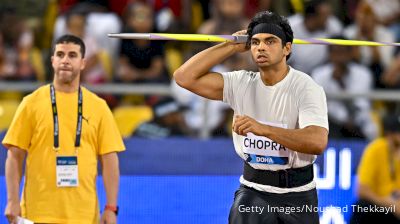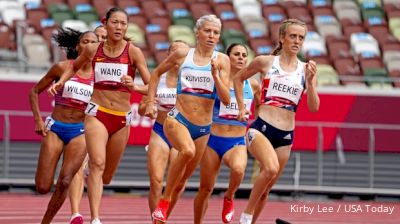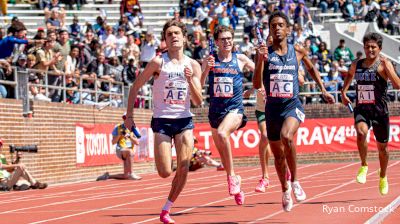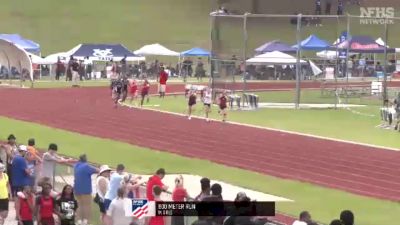Martin Fagan's Desperation
Martin Fagan's Desperation
Martin Fagan's Desperation

In October I had the good fortune of visiting with and interviewing Martin Fagan the evening before the Chicago Marathon. He seemed relaxed, confident, and, above all, happy to be healthy for the first time in several years. Chicago served as a great chance for him to qualify for the Irish Olympic team by running the A standard of 2:15:00, and Martin felt that hitting the qualifying time was a reasonable goal.
As splits were reported to the media room at Chicago, Martin was running much faster than the pace we discussed just 12 hours earlier. Upon hearing of the fast pace, Martin’s coach Keith Kelly, like Fagan a former Providence College star, was both excited and alarmed. He bolted from the media room to catch a glimpse of Martin with his own eyes.
A short time later, Martin’s splits began to crumble. His chance at earning an Olympic qualifier was lost to a DNF. This was just another frustrating running moment for Fagan who owns solid lifetime bests of 27:58 for 10k on the track and 60:57 in the half marathon. My thought in Chicago was that he lost a good opportunity to antsy racing but will get another crack at it in London or Boston this spring. All did not seem lost at the time.
On Monday, January 16, news broke of Martin Fagan’s admission of EPO use. I probably had similar feelings of anger and frustration that were common throughout the running world upon hearing this news. I could not escape from one overriding thought that dominated my mind as I read the article on BBC Sport. This is not about running and winning. Martin’s problems go beyond running.
I have not spoken to Martin since his admission, but I believe this was an act of desperation. When people are desperate they are not on their game. He used EPO, which is now easily detected. If he was setting up a systematic plan to dope with particular goals in mind, the manner in which he doped would have been different. He stated to the Irish Times, in an article published on January 18th, that “he now realises the positive drugs test was ultimately a cry for help, the result of a desperate low and severe depression he’d allowed himself sink into.”
How does an athlete get to this point? Do wins and loses make it this tough? Is depression different for an elite athlete than it is for those not relying on their body’s performance to pay the bills?
In Chicago I asked Martin what keeps him in running when faced with repeated injuries. He said he knew he could run well if healthy. Clearly he saw a positive light in his ability. Somehow there was not enough support, either from within or from the outside, to guide Martin down a more reasonable path. Instead, he ended up recklessly doping behind closed doors. Fagan told the Irish Times “right now I think back on my career with very little satisfaction. Even making the Olympics in 2008. Running really only became a job. I’d show up at a race and count the runners I could beat, and figure I might make $400. All the fun was gone, all the enjoyment.”
His admission and cooperation led to a swift two-year ban ruling by the Irish Sports Council. It seems that Fagan still has good running in front of him. Why not shoot for the 2016 Games? My hope for Martin is that running becomes a enhancing component in his life as opposed to a detrimental force. I wish him the best and hope to have future pre-race interviews where he again looks forward to racing.
As splits were reported to the media room at Chicago, Martin was running much faster than the pace we discussed just 12 hours earlier. Upon hearing of the fast pace, Martin’s coach Keith Kelly, like Fagan a former Providence College star, was both excited and alarmed. He bolted from the media room to catch a glimpse of Martin with his own eyes.
A short time later, Martin’s splits began to crumble. His chance at earning an Olympic qualifier was lost to a DNF. This was just another frustrating running moment for Fagan who owns solid lifetime bests of 27:58 for 10k on the track and 60:57 in the half marathon. My thought in Chicago was that he lost a good opportunity to antsy racing but will get another crack at it in London or Boston this spring. All did not seem lost at the time.
On Monday, January 16, news broke of Martin Fagan’s admission of EPO use. I probably had similar feelings of anger and frustration that were common throughout the running world upon hearing this news. I could not escape from one overriding thought that dominated my mind as I read the article on BBC Sport. This is not about running and winning. Martin’s problems go beyond running.
I have not spoken to Martin since his admission, but I believe this was an act of desperation. When people are desperate they are not on their game. He used EPO, which is now easily detected. If he was setting up a systematic plan to dope with particular goals in mind, the manner in which he doped would have been different. He stated to the Irish Times, in an article published on January 18th, that “he now realises the positive drugs test was ultimately a cry for help, the result of a desperate low and severe depression he’d allowed himself sink into.”
How does an athlete get to this point? Do wins and loses make it this tough? Is depression different for an elite athlete than it is for those not relying on their body’s performance to pay the bills?
In Chicago I asked Martin what keeps him in running when faced with repeated injuries. He said he knew he could run well if healthy. Clearly he saw a positive light in his ability. Somehow there was not enough support, either from within or from the outside, to guide Martin down a more reasonable path. Instead, he ended up recklessly doping behind closed doors. Fagan told the Irish Times “right now I think back on my career with very little satisfaction. Even making the Olympics in 2008. Running really only became a job. I’d show up at a race and count the runners I could beat, and figure I might make $400. All the fun was gone, all the enjoyment.”
His admission and cooperation led to a swift two-year ban ruling by the Irish Sports Council. It seems that Fagan still has good running in front of him. Why not shoot for the 2016 Games? My hope for Martin is that running becomes a enhancing component in his life as opposed to a detrimental force. I wish him the best and hope to have future pre-race interviews where he again looks forward to racing.
Related Content
 Replay: GHSA Outdoor Champs | 5A/7A | May 9 @ 7 PM
Replay: GHSA Outdoor Champs | 5A/7A | May 9 @ 7 PMMay 10, 2024
 Diamond League Doha 2024 Schedule: What To Know
Diamond League Doha 2024 Schedule: What To KnowMay 9, 2024
 A Look Back On FloTrack x On At 2024 Penn Relays
A Look Back On FloTrack x On At 2024 Penn RelaysMay 9, 2024
 How To Watch The Diamond League Doha 2024
How To Watch The Diamond League Doha 2024May 9, 2024
 Madie Boreman moves to Flagstaff ahead of Eugene Trials
Madie Boreman moves to Flagstaff ahead of Eugene TrialsMay 9, 2024
 Timothy Cheruyiot, Mary Moraa Set To Take On Wanda Diamond League Doha
Timothy Cheruyiot, Mary Moraa Set To Take On Wanda Diamond League DohaMay 8, 2024
 GHSA Outdoor Track And Field Championships 2024 Stream: How To Watch
GHSA Outdoor Track And Field Championships 2024 Stream: How To WatchMay 8, 2024
 BIG EAST Track And Field Championships 2024 Stream: How To Watch
BIG EAST Track And Field Championships 2024 Stream: How To WatchMay 8, 2024
 Replay: MHSAA Outdoor Champs | 1A/3A | May 7 @ 2 PM
Replay: MHSAA Outdoor Champs | 1A/3A | May 7 @ 2 PMMay 8, 2024